|
£95


|
Hurricane 35 Gallon Fuel
Gauge Face (Instruments pg 8 Fuel gauges 88)
This is a superb reproduction
face as per original for a Hurricane. These are exactly the
same dimension as the original and will replace the face of
any standard fuel gauge. They are engraved and good quality.
These are functional, all fuel gauges had the same
calibration and they simply altered the spacing on the faces
so it would read the correct amount thus saving calibrating
the actual mechanism for each specific aircraft. We are able
to fit these for you or you can select one of our available
gauges and have the face swapped for free.
Click on picture to enlargspecific
aircraft.
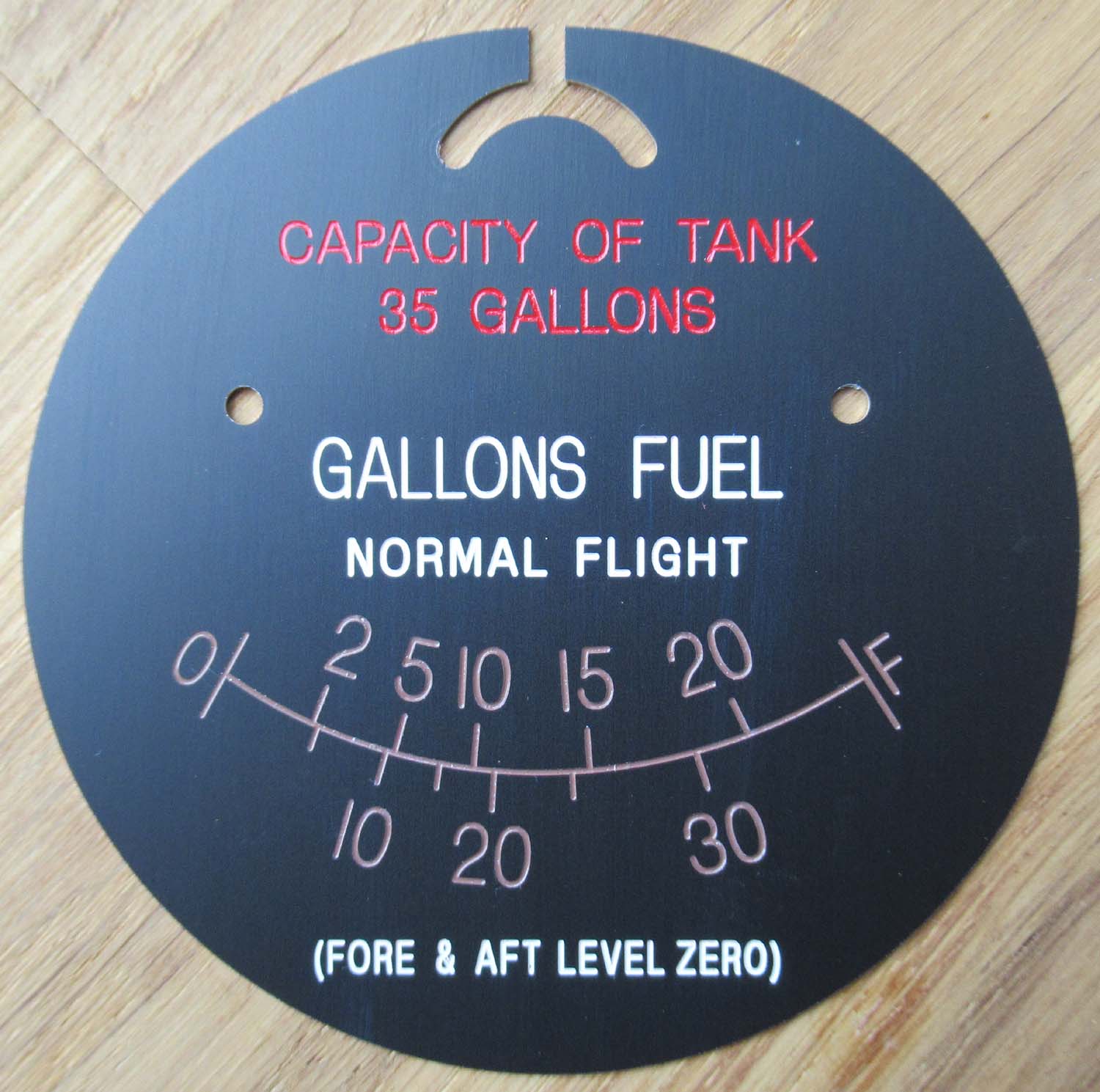
|
|
£95


|
Spitfire 37 Gallon Fuel
Gauge Face (Instruments pg 8 Fuel gauges 87)
This is a superb reproduction
face as per original for a Spitfire (MK I to MK IX). These
are exactly the same dimension as the original and will
replace the face of any standard fuel gauge. They are
engraved and good quality. These are functional, all fuel
gauges had the same calibration and they simply altered the
spacing on the faces so it would read the correct amount
thus saving calibrating the actual mechanism for each
specific aircraft. We are able to fit these for you or you
can select one of our available gauges and have the face
swapped for free.
Click on picture to enlarge
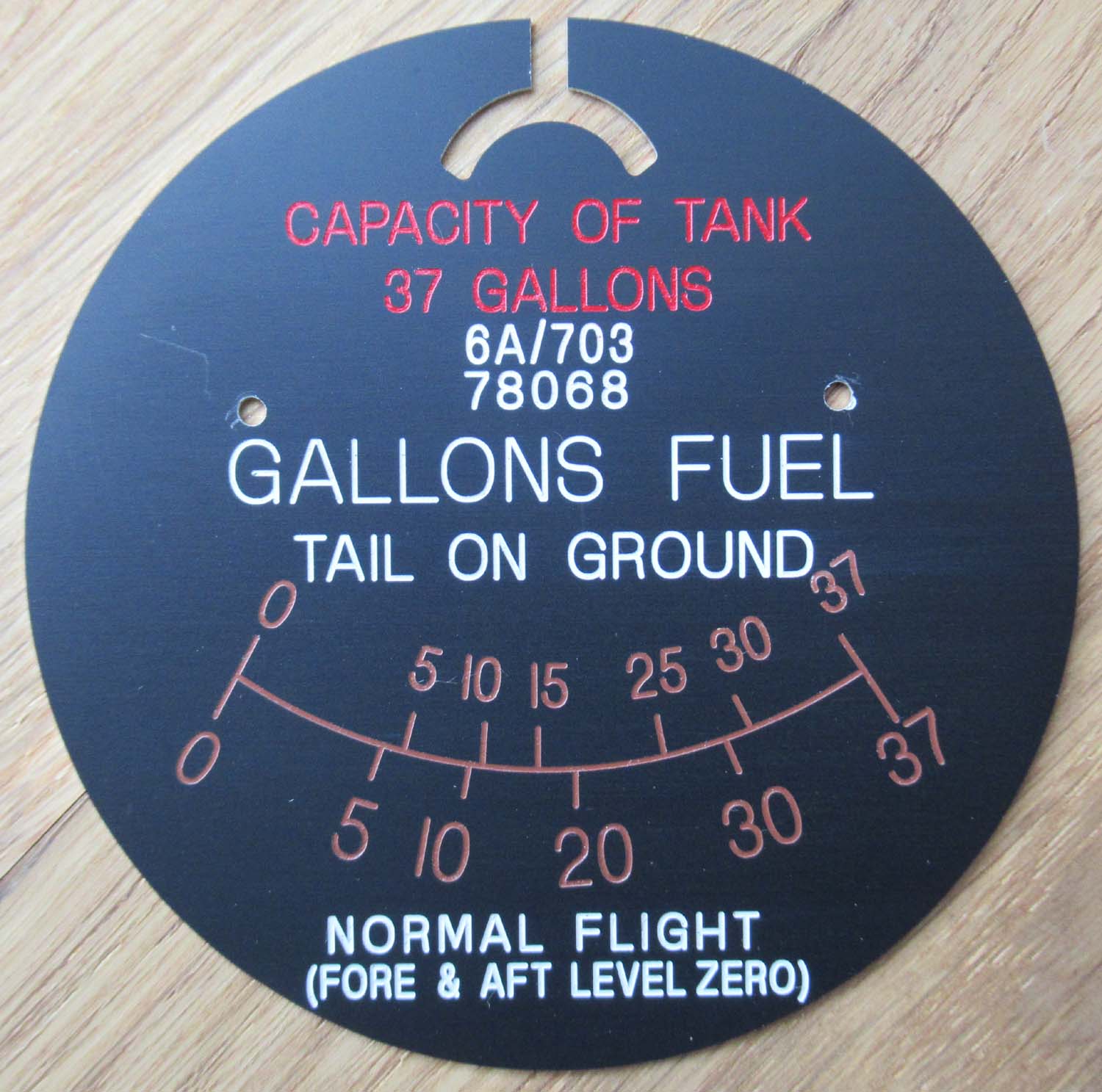
|
|
£95


|
Spitfire MK I 48 Gallon
Second Fuel Gauge Face (Instruments pg 8 Fuel gauges 86)
This is a superb reproduction
face as per original the second fuel gauge for a
Spitfire (MK I /II). These are exactly the same dimension as
the original and will replace the face of any standard fuel
gauge. They are engraved and good quality. These are
functional, all fuel gauges had the same calibration and
they simply altered the spacing on the faces so it would
read the correct amount thus saving calibrating the actual
mechanism for each specific aircraft. We are able to fit
these for you or you can select one of our available gauges
and have the face swapped for free.
Click on picture to enlarge
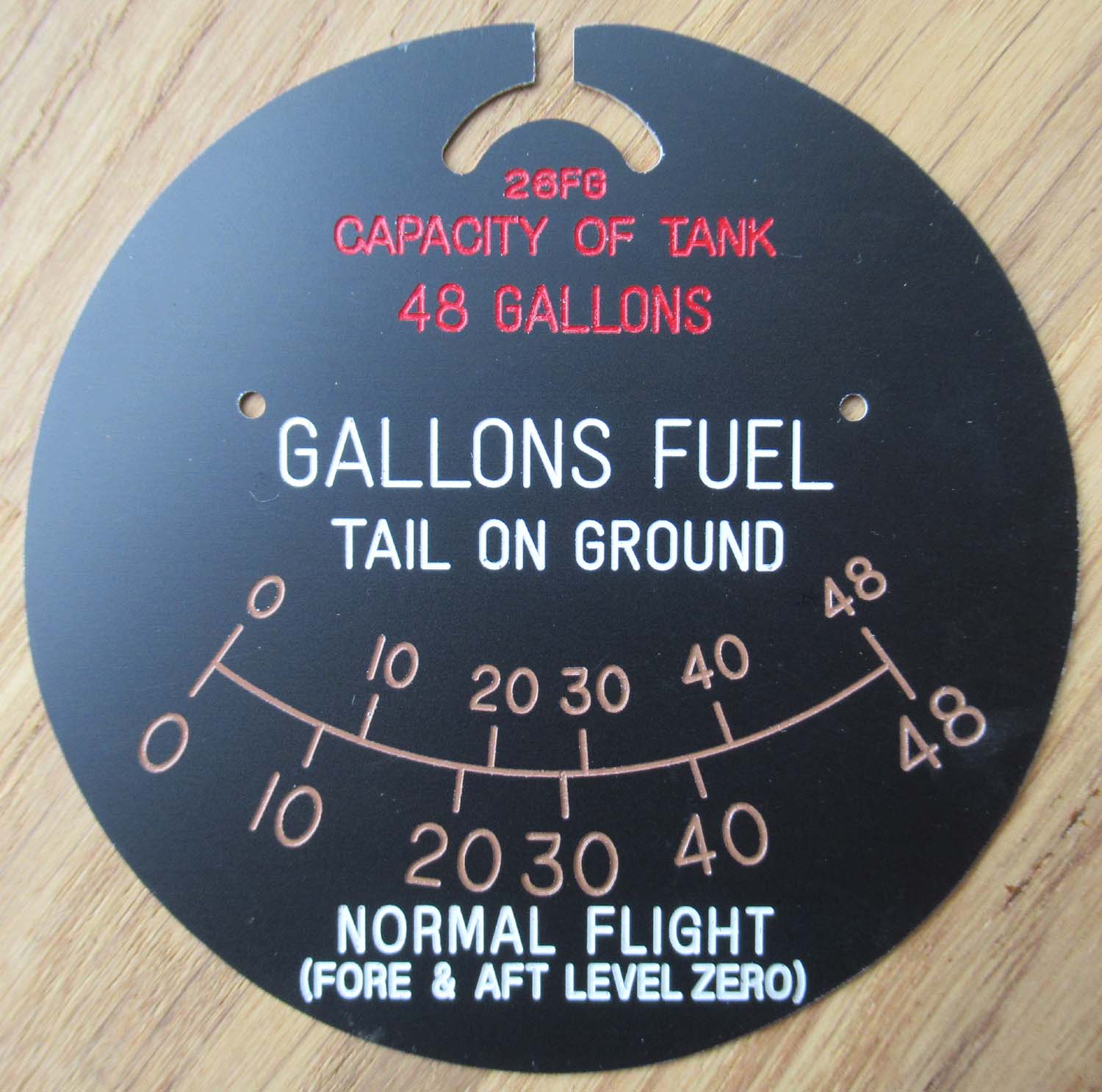
|
|
Click on pictures to enlarge
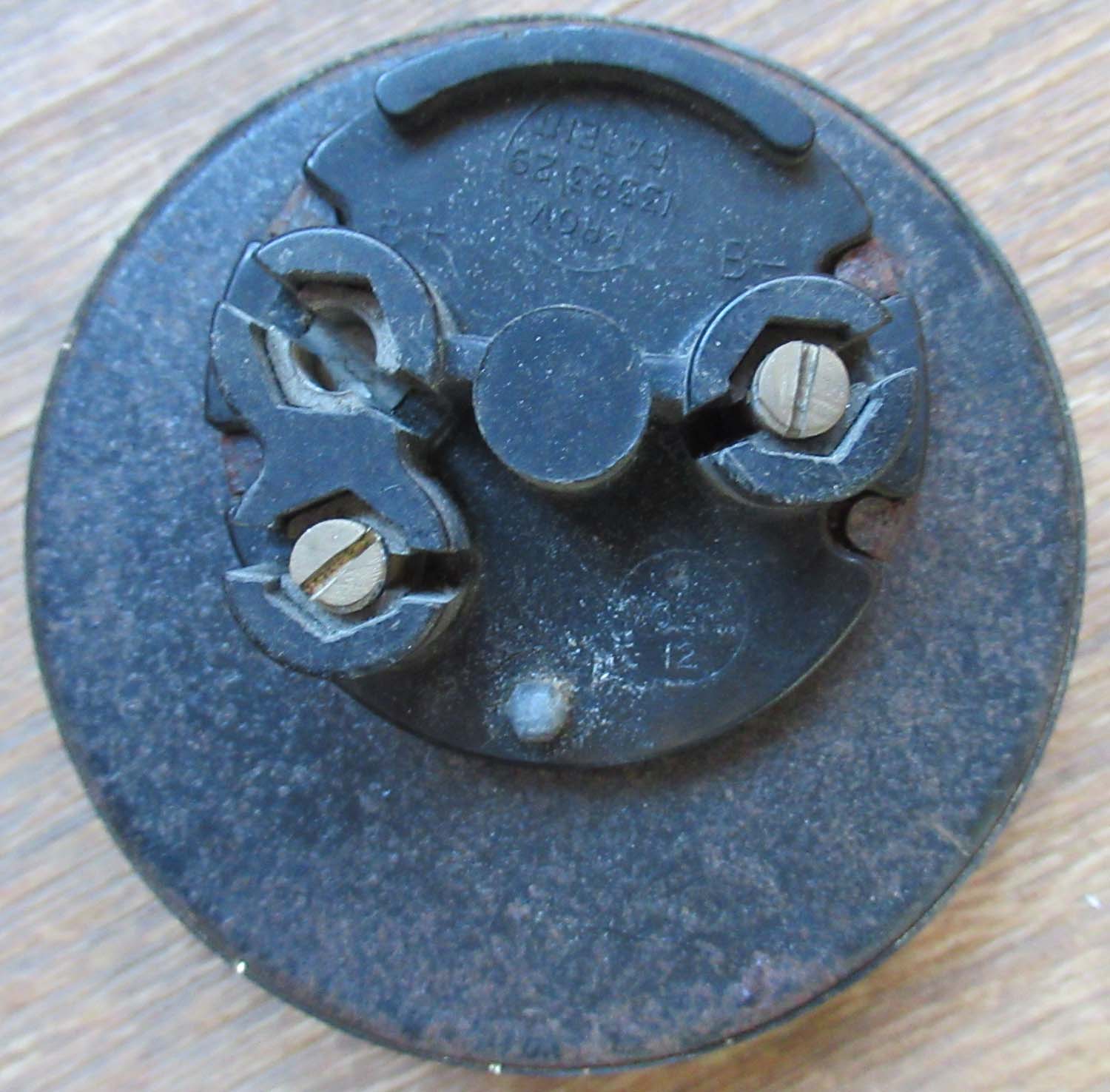
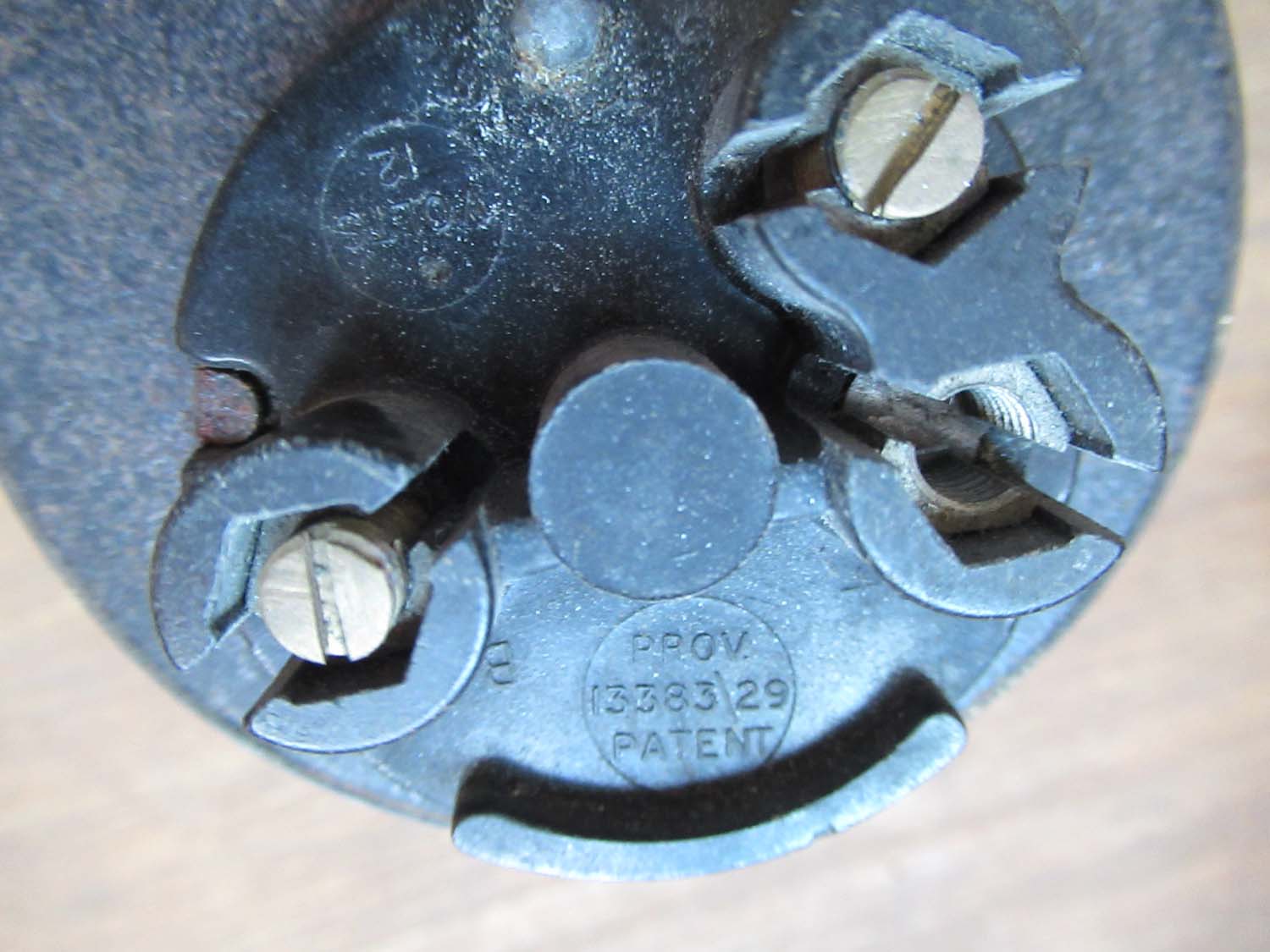
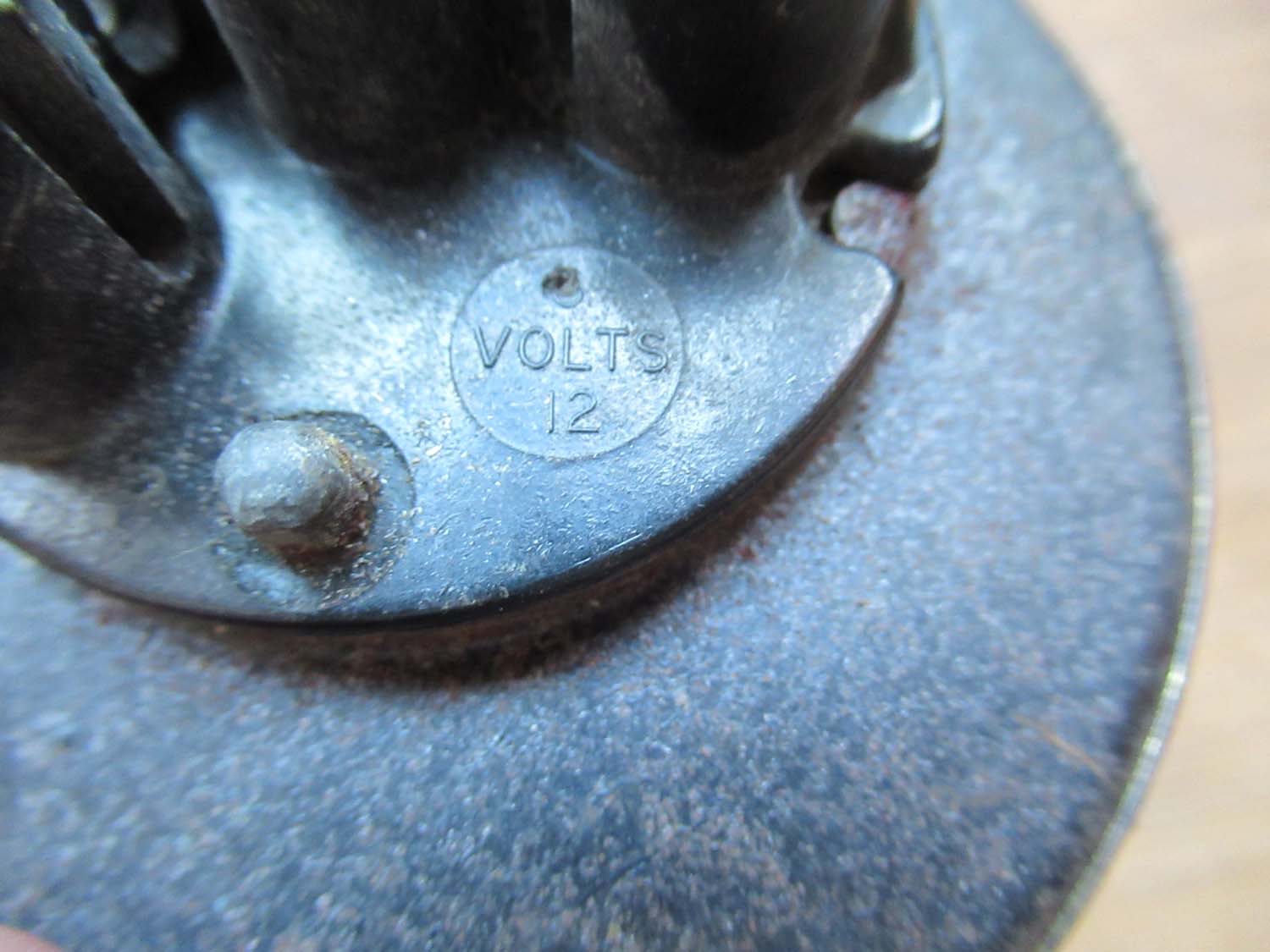
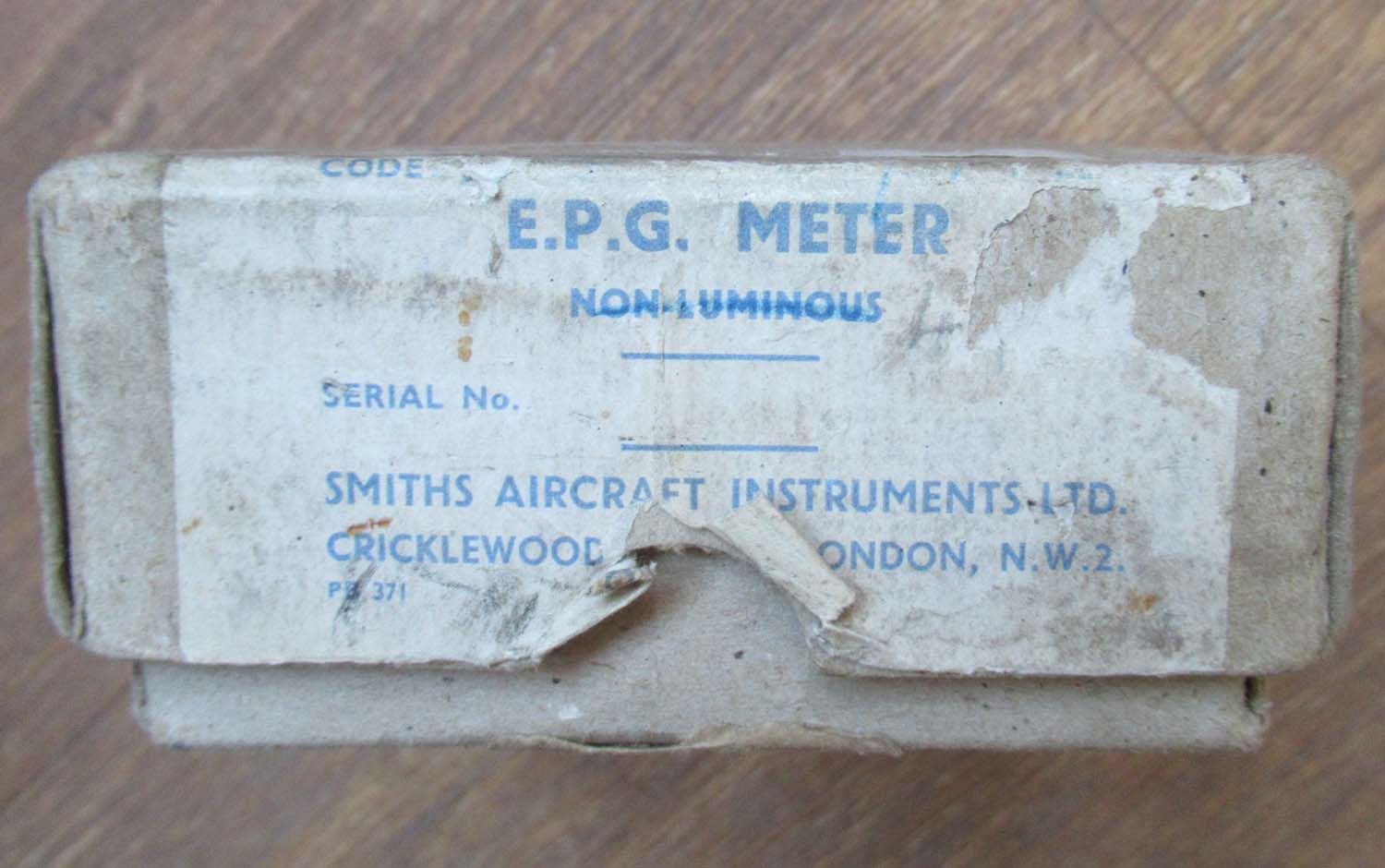
|
49 Gallon 12 Volt Fuel Gauge FG 100 (Instruments pg 8 Fuel gauges 85)
This is a very early
fuel gauge as denoted by its reference number FG 100 it is a 12 volt fuel gauge.
This was fitted to the Airspeed Oxford it is marked to 45
gallons but reads to 49 Gallons. This makes it almost
identical to the 48 Gallon 2nd gauge used in the MK I
Spitfire and an excellent substitute both for flying
aircraft and the collector in a MK I Spitfire instrument
panel. This gauge
is also period correct for the MK I Spitfire, the Oxford
prototype having flown just ten months after the prototype
Spitfire in 1936. The Spitfire went into production in 1937.
In good
original condition.
13383/29
77373
Click on pictures to enlarge
7

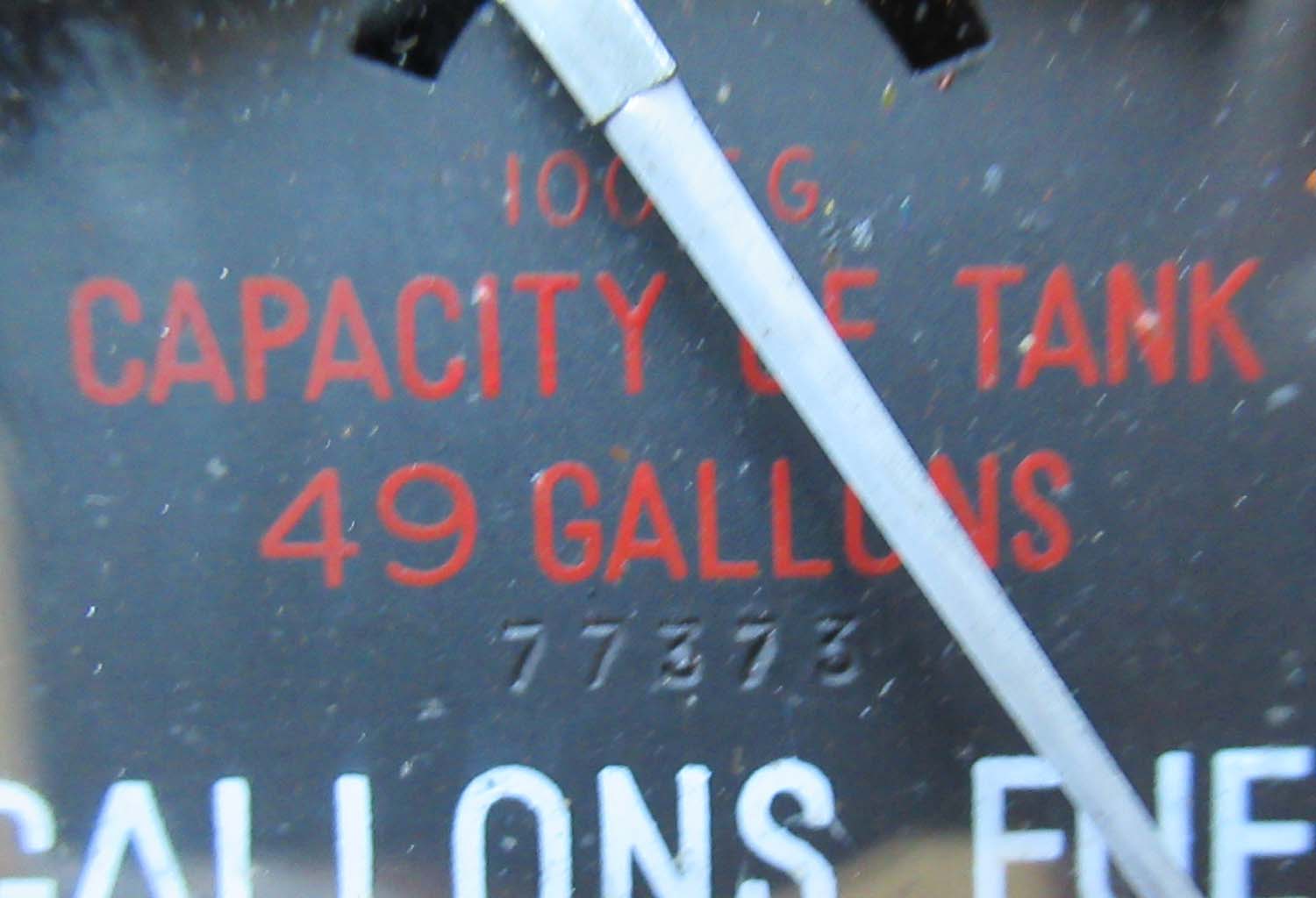

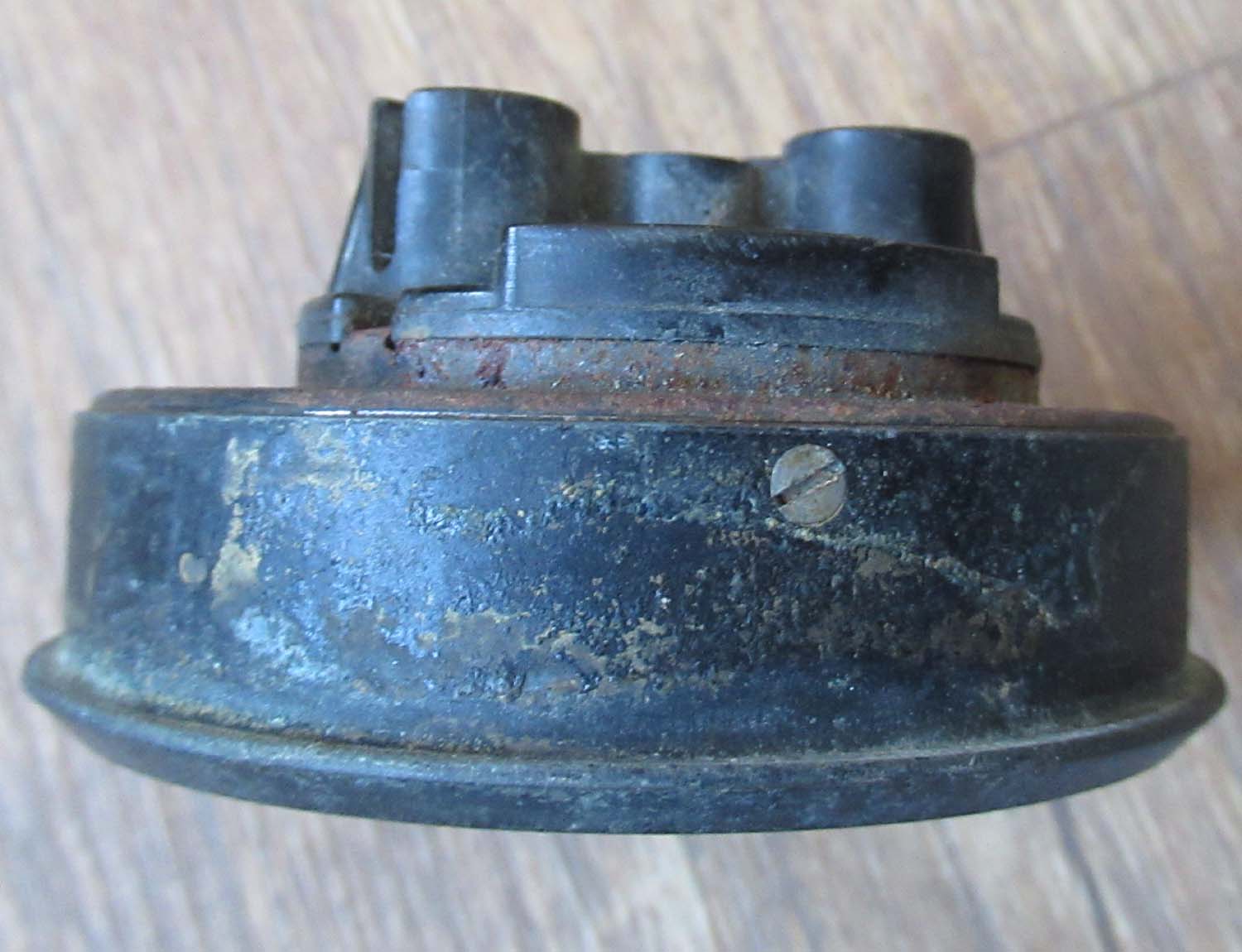
£595


|
|
Click on pictures to enlarge


|
Pioneer Fuel Gauge (Instruments pg 8 Fuel gauges 87)
This is a fuel gauge in good
original condition made by Pioneer. I have seen similar fuel
gauges used for drop tanks but so far am unable to identify
what aircraft this belongs to.
Ref No:
Click on pictures to enlarge


£75


|
|
Click on pictures to enlarge




£195


|
Douglas C47 Fuel Gauge (Instruments pg 8 Fuel gauges 86)
This is a C47 fuel
gauge in good
original condition. Fully functioning, showing all four fuel
tanks.
Few
aircraft are as well known, were so widely used or used as
long as the C-47. Affectionately nicknamed the "Gooney
Bird," this aircraft was adapted from the Douglas DC-3
commercial airliner. The U.S. Army Air Corps ordered its
first C-47s in 1940, and by the end of World War II,
procured a total of 9,348. These C-47s carried personnel and
cargo around the globe. They also towed troop-carrying
gliders, dropped paratroops into enemy territory, and air
evacuated sick or wounded patients. A C-47 could carry 28
passengers, 18-22 fully equipped paratroopers, about 6,000
lbs. of cargo or 18 stretchers and three medical personnel.
Ref No:
106A/1460
Click on pictures to enlarge



Seen under in
situ in a C47
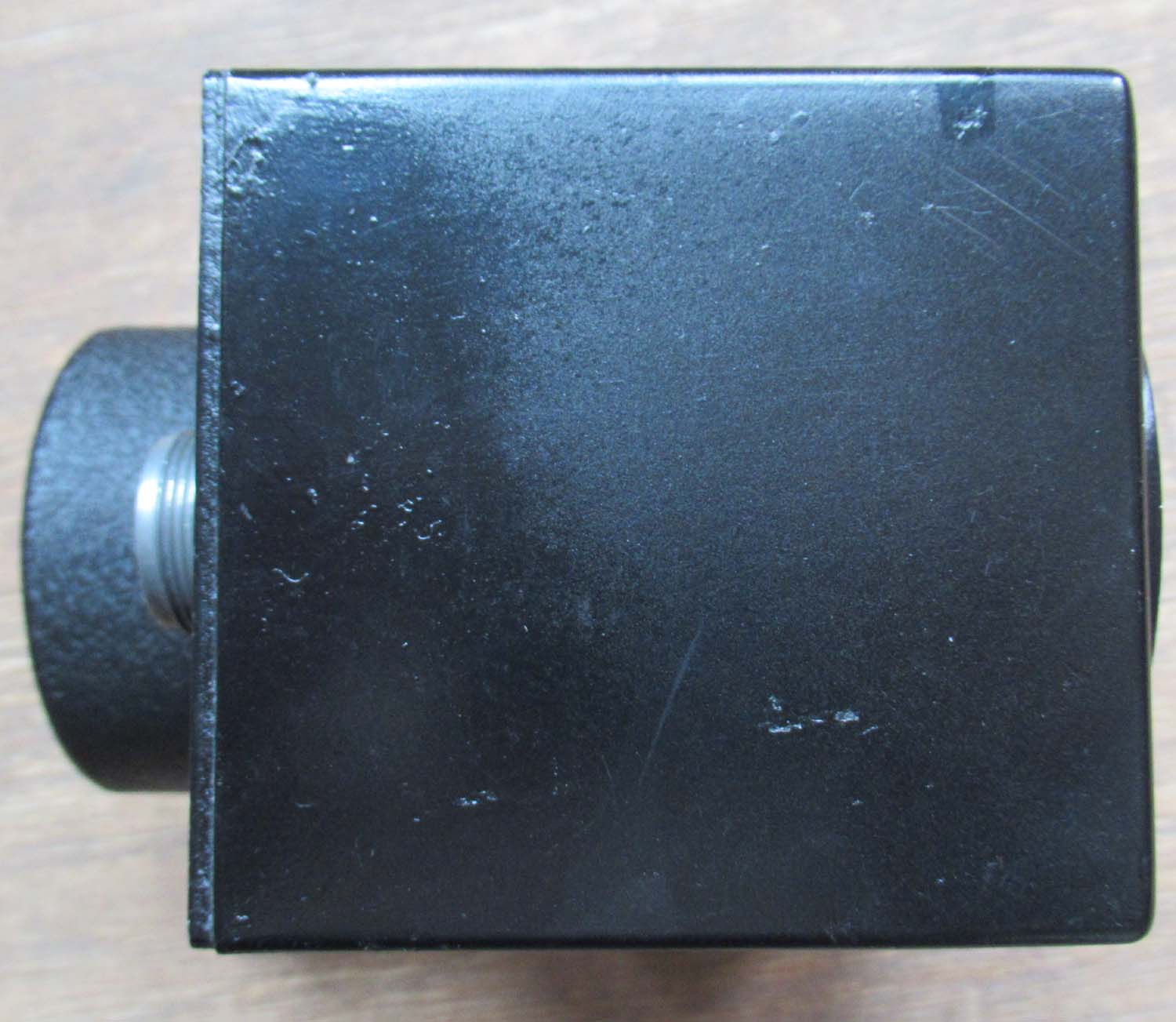
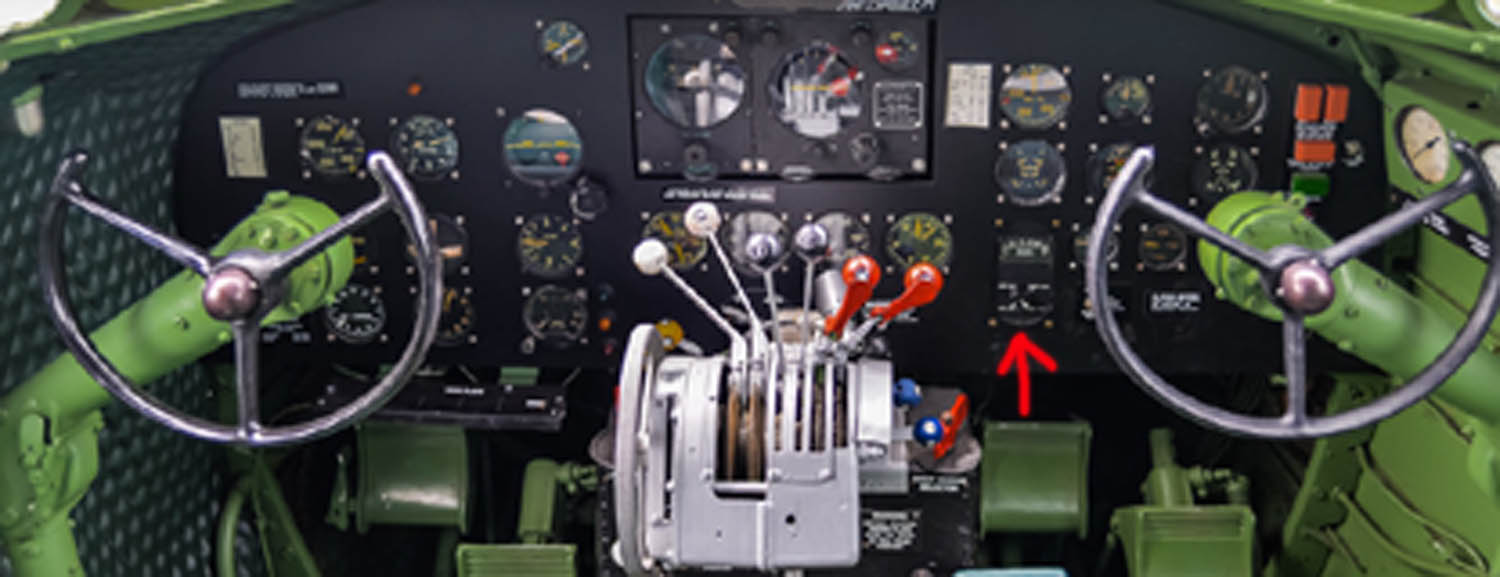
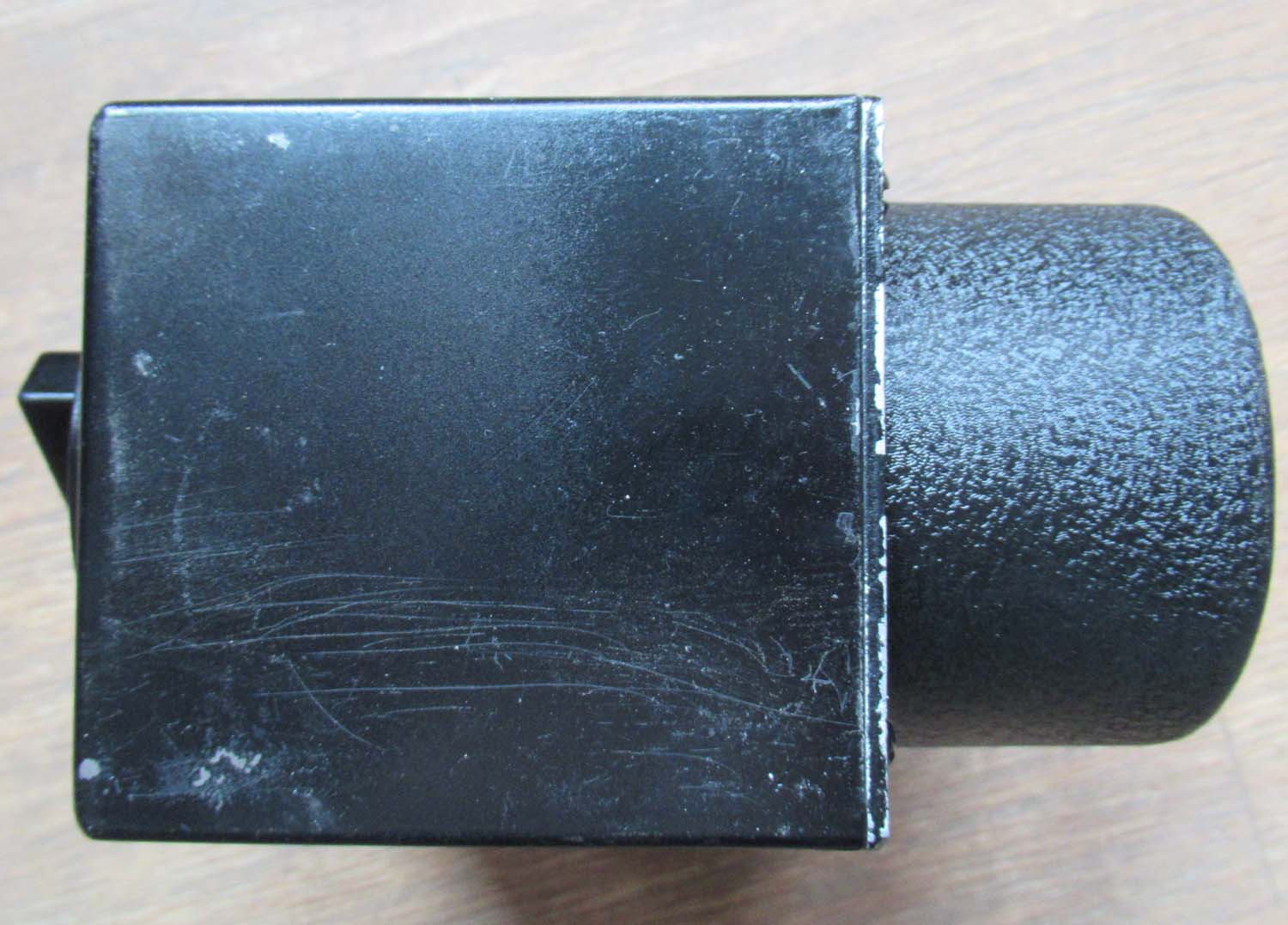
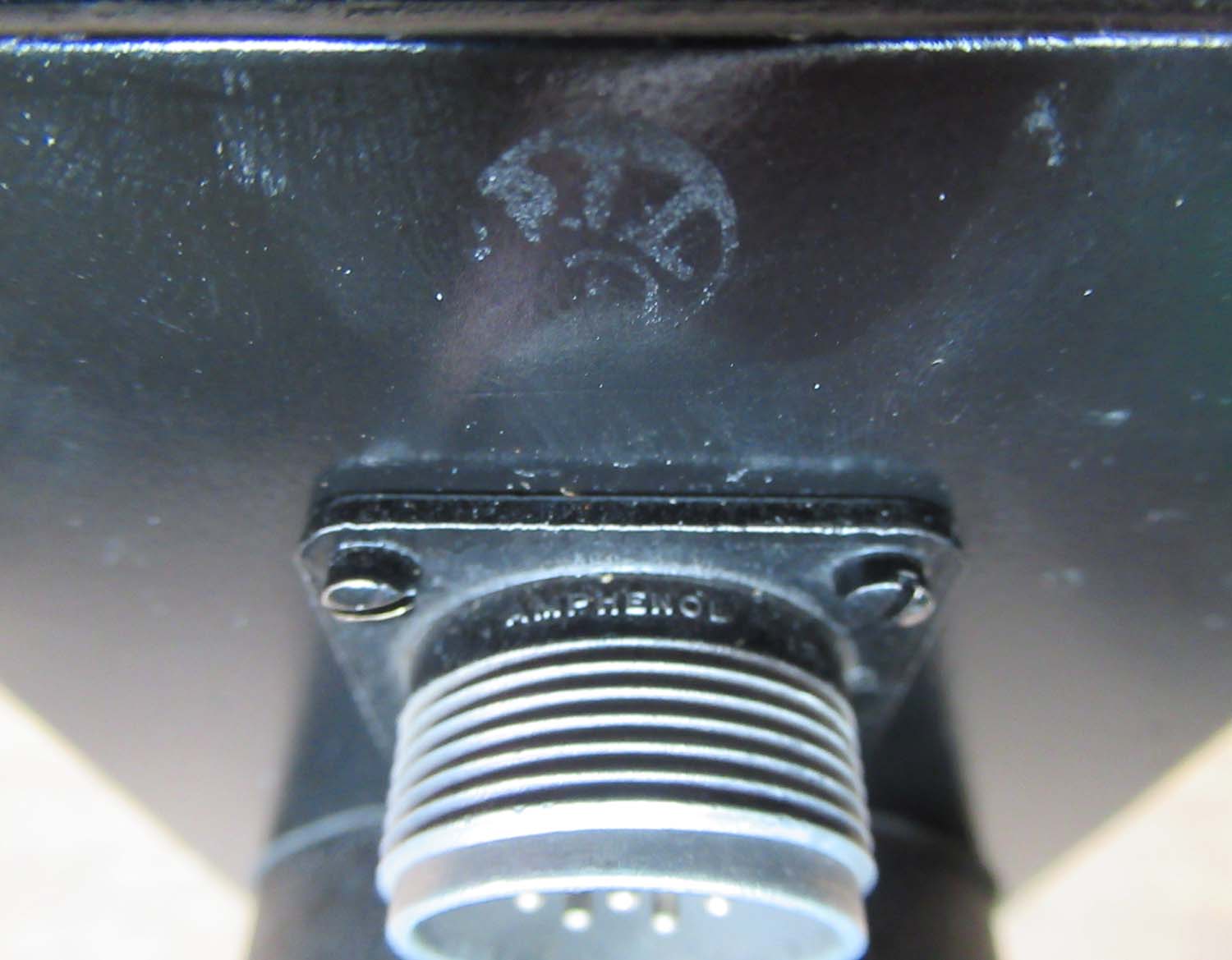
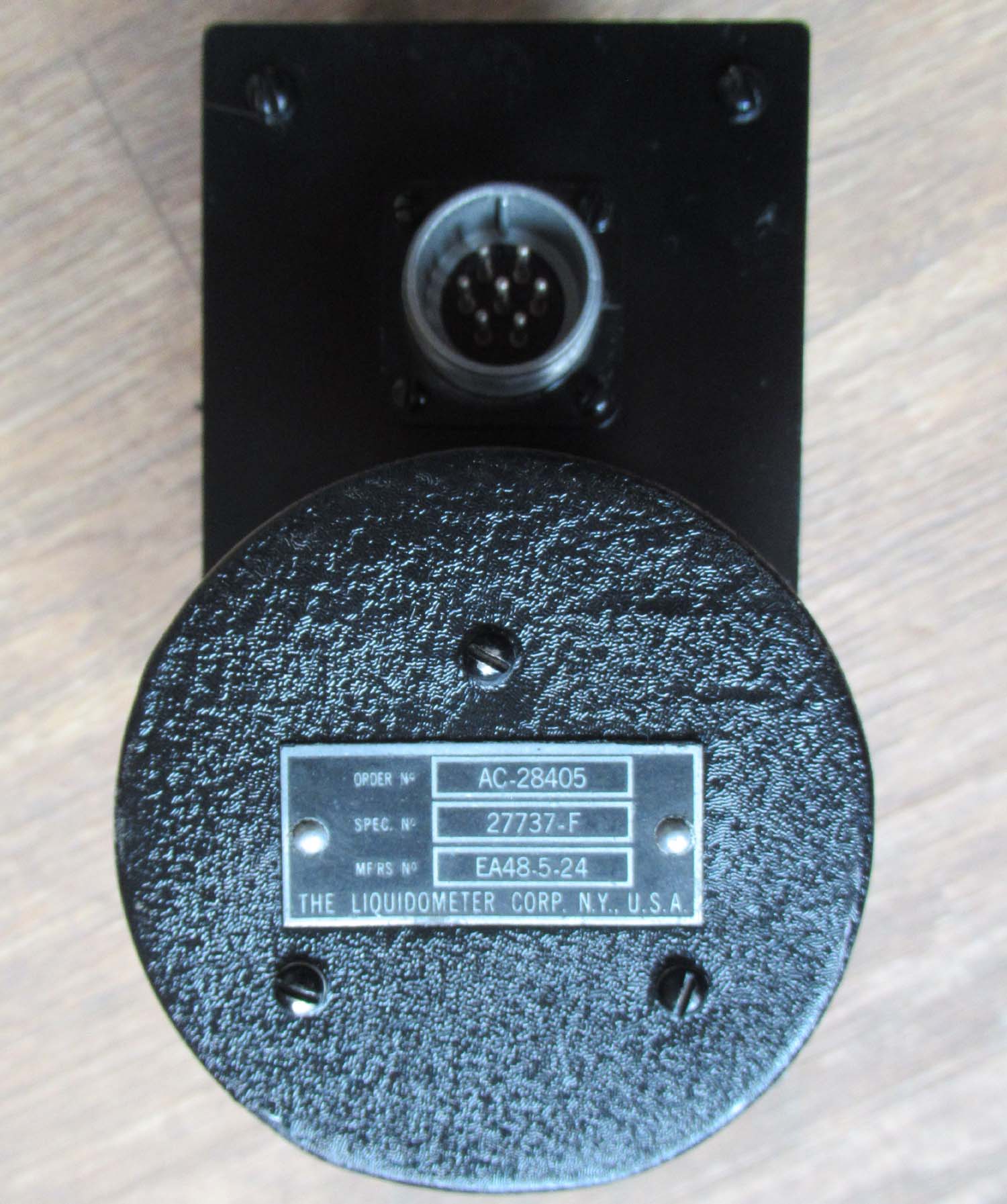
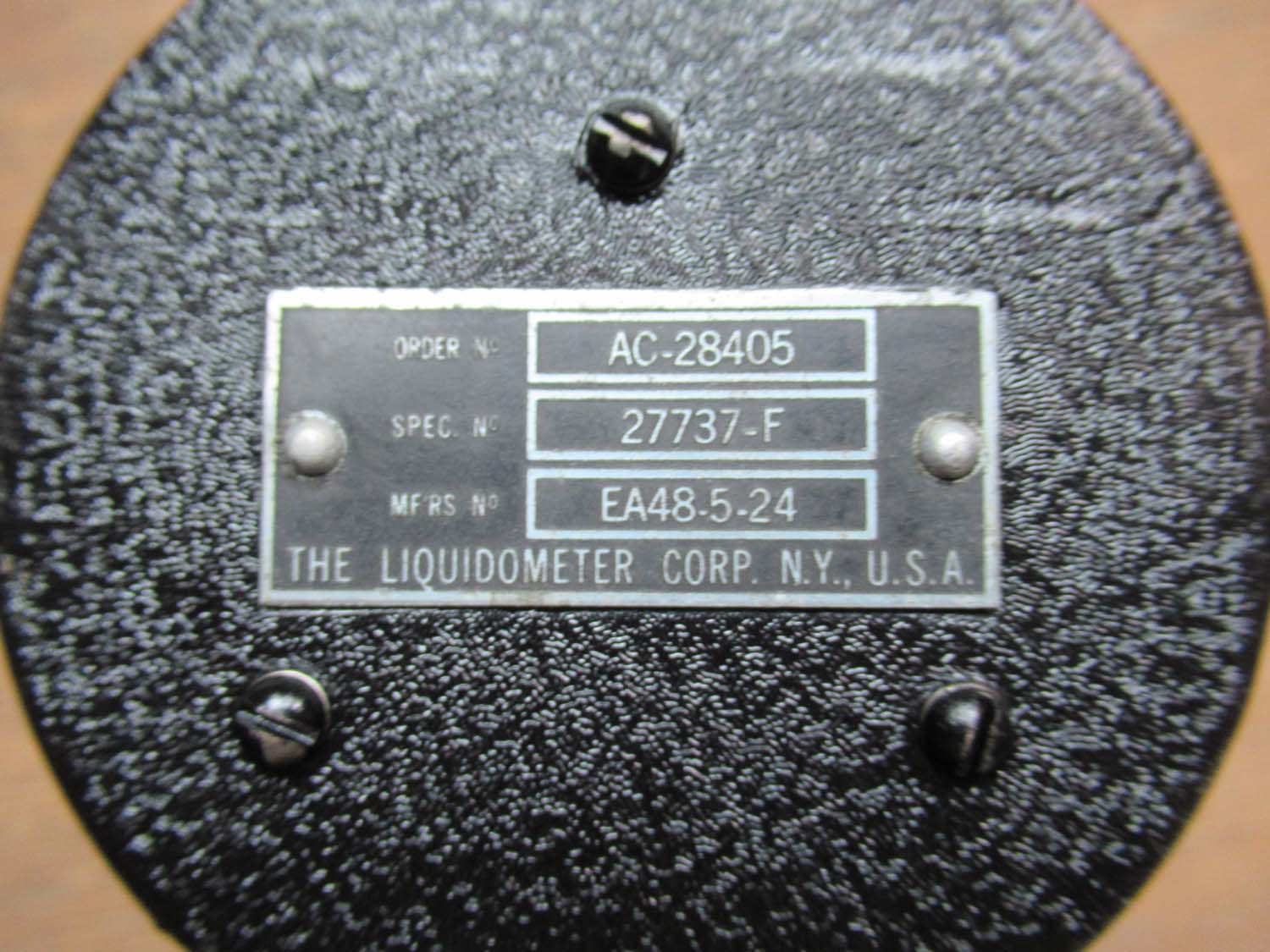
|
|
Click on pictures to enlarge


|
1941 Fuel Pressure Gauge (Instruments pg 8 Fuel gauges 84)
This is a super rare fuel
pressure gauge as used in the early MK I/II Spitfires, this
one has an intact short capillary so for fighter use.
Dated 1941
11254/41
Click on pictures to enlarge



Out of stock
more wanted
contact me |
|
Click on pictures to enlarge



|
49 Gallon 12 Volt Fuel gauge
FG 100 (Instruments pg 8 Fuel gauges 83)
This is a very early
fuel gauge as denoted by its reference number FG 100 it is a 12 volt fuel gauge.
This was fitted to the Airspeed Oxford it is marked to 45
gallons but reads to 49 Gallons. This makes it almost
identical to the 48 Gallon 2nd gauge used in the MK I
Spitfire and an excellent substitute both for flying
aircraft and the collector in a MK I Spitfire instrument
panel. This gauge
is also period correct for the MK I Spitfire, the Oxford
prototype having flown just ten months after the prototype
Spitfire in 1936. The Spitfire went into production in 1937.
In good
original condition and complete with its mounting bracket.
50058
332314
Click on pictures to enlarge

 
£595


|
|
Click on pictures to enlarge



|
Spitfire FR MK XIV &
Seafire 45-47 Fuel gauge 880FG (Instruments pg 8 Fuel gauges 82)
This is a 880/FG fuel gauge
for a fighter reconnaissance Spitfire MKXIV and also a
Seafire 45 through to 47.
In good
original condition.
880FG
9010E1
6A/1916
Click on pictures to enlarge


£295


|
|
Click on the
pictures to enlarge


|
Lancaster 580 Gallons Fuel
Gauge FG 483 (Instruments pg 8 Fuel gauges 80)
Here is a
fuel gauge in very good condition, used specifically in the Avro Lancaster mounted
in the flight engineers panel whose job it was to maintain
the engines and manage the fuel on the long flights into the
Third Reich.
FG 483
5A/1215
Click on the
pictures to enlarge

Out of stock
more wanted
contact me
|
|
Click on the
pictures to enlarge


|
Sea Fury Fuel gauge (Instruments pg 8 Fuel gauges 79)
Here is a fuel gauge
with a capillary which is unfortunately broken I have spoken
to someone recently who says these can be repaired. I have
been told this is from a Sea Fury but its not on my list so
cannot confirm this.
Click on the
pictures to enlarge





FG
2971/544
£195


|
|
Click on the
pictures to enlarge


|
Lancaster 580 Gallons Fuel
Gauge FG 483 (Instruments pg 8 Fuel gauges 78)
Here is a
fuel gauge used specifically in the Avro Lancaster mounted
in the flight engineers panel whose job it was to maintain
the engines and manage the fuel on the long flights into the
Third Reich. This one is missing its rear cover.
FG 483
Click on the
pictures to enlarge


£125


|
|
Click on the
pictures to enlarge


|
Lancaster 580 Gallons Fuel
Gauge FG 483 (Instruments pg 8 Fuel gauges 77)
Here is a fuel gauge
used specifically in the Avro Lancaster mounted in the
flight engineers panel whose job it was to maintain the
engines and manage the fuel on the long flights into the
Third Reich.
FG 483
Click on the
pictures to enlarge


£125


|
|
Click on the
pictures to enlarge


|
German Luftwaffe Fuel gauge (Instruments pg 8 Fuel gauges 76)
Here is a fuel gauge
used in various Wartime Luftwaffe aircraft.
Designation: electr.
consumption indicator
Request character: Fl.XXX,
Device no.: 9-2182 B-1
Measuring range: 0 – 500 L/h
Manufacturer: LGW-Hakenfelde, Berlin (Siemens)
Year of construction: approx. 1944
Click on the
pictures to enlarge

£295


|
|
Click to
enlarge pictures


£95


|
Lancaster 580 gallon Fuel
gauge (Instruments pg 8 Fuel gauges 74)
 
483 FG
Here is
a fuel gauge from a Lancaster, it reads to 500 gallons but
the tank actually held 580 gallons.
It comes with a stores
ticket which is quite smudged but if put under a microscope
would probably be readable.
I can make out what appears to
be an aircraft serial number following the words removed
from of RE 310. a quick search comes back as a Lincoln.
.
|

Click to
enlarge pictures

|
Early Jet Fuel Gauge (Instruments pg 8 Fuel gauges 72)
Here is a fuel gauge,
possibly from an early Jet.
Estimated
to be from the year 1951.
 
£45


|
|
Click on
the pictures to enlarge them.


£95


|
Avro Lincoln Fuel gauge (Instruments
pg 8 Fuel gauges 70)

799 FG
Just too late to see
service during the Second World War, the Lincoln became the mainstay of Bomber
Command post-war, but was destined for a short front line career as the Cold War
and the jet age brought the shortcomings of its performance into sharp relief.
The RAF’s lack of an
aircraft with sufficient range to be deployed in the Pacific led the Air
Ministry to suggest that AV Roe Limited design an enlarged Lancaster to meet the
requirement. The resulting Lincoln first flew in June 1944. However, the need to
maintain supplies of Lancasters delayed production until 1945; the first
production Lincolns reaching No.57 Squadron in August. Lincolns were intended to
join the Tiger Force in the bombing of Japan but the war ended before they were
needed.
583 Lincolns were built
to equip around twenty squadrons. However, inferior performance in the face of
jet fighters and the need to be able to reach targets behind the Iron Curtain
saw their partial replacement with Boeing Washington’s from 1950. The type saw
action against communist terrorists in Malaya in 1950 and Mau-Mau dissidents in
Kenya from 1953, but Lincolns were finally superseded by the jet V-Bomber force
from 1955.
The last Lincolns in RAF
service were those engaged in radar development trials with No.151 Squadron,
Signals Command until May 1963.
|
|
Click to
enlarge pictures


|
Bristol Blenheim Fuel Gauge
(Instruments pg 8 Fuel gauges 1)
Here is a fuel gauge for the famous Bristol
Blenheim. Complete with mounting ring.

229FG
Out of stock
more wanted
contact me |
|
Click to
enlarge pictures

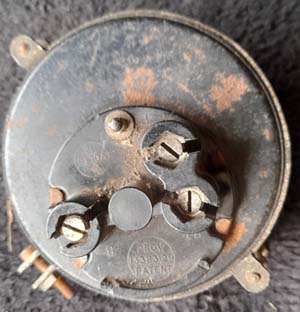 |
Bristol Blenheim Fuel Gauge
(Instruments pg 8 Fuel gauges 2A)
Here is a
white faced fuel gauge for the famous Bristol Blenheim.

229FG
£495 Nos
2A


|
|

Click on the
picture's to enlarge
 |
Boxed Beaufighter
(Instruments pg 8
Fuel gauges 4)
FG/339
Boxed fuel gauge for the Beaufighter
dated on the box the 9th March 1944.

£ 125


|

 |
Canadian Fuel
gauge
(Instruments pg 8 Fuel
gauges 5)
So far I am unable to
identify the aircraft this fuel gauge was used in. In
excellent condition its similar in style to the Mosquito .
Type DJ 4
24 Volts
Ref 6AA/794
General
Electrics Canada
£125


|

This a fuel gauge for a
Lancaster marked to 500gallons, the tank actually held about
580 gallons.
483 FG |
Lancaster 500 gallon fuel gauge
(Instruments pg 8 Fuel
gauges 14)

£125


|

Click on the
picture to enlarge
371 FG |
Fuel
gauge 3
(Instruments pg 8 Fuel
gauges 14C)
£75


|
|
Lancastrian Fuel gauge
3 (pg5 ins)
 |
Lancastrian Fuel
gauge 3
(Instruments pg 8 Fuel
gauges 16)
Ref 1894
Type 218
874 FG
£75


|
|

Click on the
picture to enlarge
FG 752
£125


|
Miles Monitor Fuel gauge (Instruments pg 8 Fuel
gauges 16A)
This is a
real rarity a fuel gauge from a Miles Monitor

Seen Above the Miles Monitor.
Miles Monitor.
The Miles M.33 Monitor was
a twin-engine British target tug aircraft designed
and built by Miles
Aircraft towards
the end of the
Second World War.
Intended
for use by the Royal
Air Force and
the Fleet Air Arm, the aircraft did
not enter service with either. Only 22 of these aircraft
were ever built. |
 
|
Long range
Mosquito fuel gauge
(Instruments pg 8 Fuel
gauges 17)
A really nice Wartime fuel gauge.
Made by Smiths.
AP lists the A/M 6A/1322 as Type 111
(474 FG) Mosquito 1,2 & NF12
A/M 6A/1322
£125


|
|
It is interesting to see the
Spitfire evolution from MK1 to F22 and the changes in fuel
gauges listed under.
MK I Spitfire

MK V
Spitfire

MK IX
Spitfire
 |
37 Gallon
Reproduction Spitfire Fuel gauge
(Instruments pg 8 Fuel
gauges 19)
This is a 37gallon fuel gauge
for the Spitfire only. The gauge itself is
a
new made reproduction. Comes complete with its mounting bracket.
Please note this is for display only it does not function.
Click on the
picture's to enlarge.
 
Out of stock more required please
contact me |
|
Click on the
picture's to enlarge.

 |
Tempest MK II and V Fuel
gauge (Instruments pg 8 Fuel
gauges 20)
This is an original fuel
gauge used in the Tempest MK II and Mk V in good clean
condition.
718 FG
Click on the
picture's to enlarge.
  
Shown above
the Hawker Tempest MK II
Initially conceived as an upgraded, thin-wing
Typhoon, the Tempest reached the ultimate in piston fighter
performance. The Tempest Mk.II was designed to accommodate
the Bristol Centaurus radial engine, thus loosing its
beard-type radiator so typical for the Napier Sabre-powered
Typhoons and Tempests. The prototype Tempest II made its
maiden flight on June 28, 1943, but the production machines
of this mark arrived just too late to take part in the war.
£295


|

Below a MK
XIV Spitfire

|
Mk FR XIV
Spitfire Original fuel gauge
(Instruments pg 8 Fuel
gauges 21)
This is a really superb
rectangular type fuel gauge specifically for the MK XIV
Spitfire.
On the box
6A/1916 qty 1 code 878.FG Indicator type Spitfire
FR XIV.
£295


|


 |
Mk 21/22
Spitfire Original fuel gauge
(Instruments pg 8 Fuel
gauges 22)
This is an original fuel
gauge made specifically for the MK 21 and MK 22 Spitfire the
last in a long line of this superb iconic aircraft. This
gauge is in good condition and should be serviceable.
6A/1575
726 FG
Shown under and left the MK
or F 22 Spitfire

£295


|
Click on the
pictures to enlarge them
 |
Spitfire Fuel Gauge Bracket MkXIV (pg1 fuel)
This is a reproduction piece.
This fits the later Griffon Powered Spitfires fuel gauges as
fitted the the MK XIV onwards.
Click on the
pictures to enlarge them

This piece is available in fuel please
click on the link
to see it.
|

 |
De Havilland
Hornet Fuel gauge
(Instruments pg 8 Fuel
gauges 23)
This is a very rare piece indeed
this is fuel gauge for a Hornet.
781 FG

The de
Havilland DH.103 Hornet was a
piston engine fighter that further exploited the wooden
construction techniques pioneered by the classic Mosquito.
Entering service at the end of the WWII, the Hornet equipped
post war RAF Fighter Command day fighter units in the UK and
was later used successfully as a strike fighter in Malaya.
The Sea Hornet was a carrier-capable version.
£125


|
|

 |
Fuel Flow Meter
(Instruments pg 8 Fuel gauges 24)
Does exactly what it says,
this is meter which measured the amount of fuel filling the
tanks of Heavy Bombers like the Lancaster. Nice original
condition air ministry marked.

£85


|

Good original condition.
400FG Fuel Port nose tank
 |
Fuel Gauge Halifax Bomber
(Instruments pg 8 Fuel gauges 25)

For one Halifax crew on 6 October
1944, the presence of 610 Squadron’s Spitfires became a
godsend.

£125


|
|

Click on the
pictures to enlarge

|
Fuel Gauge Halifax Bomber
(Instruments pg 8 Fuel gauges 25A)
789 FG
£125


|
|

 |
Sea Otter fuel
gauge (Instruments pg 8 Fuel gauges 26)
A very unusual and
interesting fuel gauge from a Sea Otter. No complete
examples of this aircraft have survived.
The Sea
Otter was broadly based on the Walrus, with a tractor engine
and more refined construction. It could be either Carrier or
shore based and served with the RAF Coastal Command and the
Fleet Air Arm. It consisted of two marks, Mk I Amphibian
with optional under wing bombs or depth charges and the
A.S.R. Mk II Air/Sea rescue version. The first production
aircraft was delivered in August 1943, and a total of 4 had
been delivered by the end of the year, the rest been
delivered in 1944 and 1945. The Sea Otter was the last
biplane to enter RAF and FAA service in 1944. A total of 292
were built mainly for the FAA although only 94 had been
delivered by August 1945.
FG176
£95


|
|
Click to
enlarge picture



|
Lancaster Fuel
gauge
(Instruments pg 8 Fuel
gauges 28)
Fuel gauge as
fitted to the engineers panel of the Lancaster.
6A/1664
Click to
enlarge picture



£125


|
|
Click on
picture to enlarge

£95


|
Avro York Fuel
gauge
(Instruments pg 8 Fuel
gauges 29)
Nice condition fuel gauge for
the Avro York. Manufactured by Avro and incorporating the
wings, tail, undercarriage and engines of the Lancaster
bomber, the York was to prove a useful military and civilian
transport aircraft in war and peace.

|

Click on
picture to enlarge` |
40 Gallon twin tank fuel gauge
(Instruments pg 8 Fuel gauges 31)
12 Volt
FG 2187 FG
Looks very similar to a Mosquito fuel
gauge but the FG number is not on my list so I cannot say
what aircraft it was fitted to,, but it is from a tail
dragger.
£95


|
 |
Twin 84 gallon Fuel gauge
(Instruments pg 8 Fuel gauges 33)
Not sure about this one?
1058/FG
£45


|
 |
Fuel gauge 593 gallons
(Instruments pg 8 Fuel gauges 34)
Hairline crack in glass,
probably from a heavy bomber.
£55


|
 |
Fuel Meter 2 (Instruments
pg 8 Fuel gauges 35)
Early wartime fuel meter
.Used by the RAF tankers to measure the transfer of
fuel to Heavy bombers.
I have
multiples available.
£50


|

Rear tank from a Wellington 292 FG |
Wellington Fuel Gauge
(Instruments pg 8 Fuel gauges 38)
/wellingtonew_5.jpg)
£125


|

WW2 the Australian built
Beaufort was perhaps the most important RAAF medium bomber.
 |
RAAF Fuel Gauge
(Instruments pg 8 Fuel gauges 39)
A Really nice fuel gauge
from the Royal Australian Air Force.
6a/3274
from a
DAP Beaufort.


£125


|
 |
180 Gallon Fuel
Gauge
(Instruments pg 8 Fuel
gauges 40)
180 Gallon fuel gauge by
Smiths.
£55


|

Click on the
picture to enlarge |
Av
Gas Fuel gauge
(Instruments pg 8 Fuel
gauges 41)
Nice condition Av Gas 212
gallon fuel gauge.
6A/3128
£55


|

Click on the
picture to enlarge |
Smiths 70 gallon fuel gauge
(Instruments pg 8 Fuel
gauges 42)
1414 FG
6A/3722
24 Volt
Out of stock
more wanted
contact me |
 |
380 Gallons fuel gauge
(Instruments pg 8 Fuel gauges 44)
380 Gallon fuel tank,
almost certainly from a 4 engine heavy Bomber by
Smiths
£55


|

 |
Fuel gauge for a
Buckingham
(Instruments pg 8 Fuel
gauges 45)
Designed as a fast, light
twin-engine bomber. Delivery was delayed because the engines
were unavailable. Handling was poor, and performance
unimpressive. The operational need for them had disappeared
when they were delivered.
The Buckingham was mainly
used as fast transport.
Outer tank 159 gallon fuel gauge .
£55


|

90 gallon fuel gauge fitted to the Barracuda.

Boxed in mint
condition there are no surviving Barracudas in existence
today.
 |
Barracuda fuel gauge
(Instruments pg 8 Fuel gauges 47)
First flown in
December 1940, the Fairey Barracuda torpedo bomber was
designed to replace the obsolete Fairey Swordfish and
Albacore biplanes as a front-line combat aircraft.
Production and other delays however meant the aircraft type
did not begin to see widespread service until 1943. The
Barracuda then served in a wide variety of capacities until
VJ Day. The design achieved prominence in 1944 when forty
Barracudas took off in two waves to successfully attack the
German pocket battleship Tripitz anchored in a Norwegian
fiord. Several Canadian pilots were involved in this famous
attack.
The Barracuda also saw numerous
actions with the British fleet in the Pacific. Despite its
ungainly appearance, the aircraft could carry out a wide
variety of missions and was progressively modified to carry
bombs, mines, torpedoes, depth charges, rockets, radar masts
and radomes, lifeboats and even containers under the wings
for dropping agents into occupied territories. Two Royal
Canadian Navy squadrons, Nos 825 and 826, were initially
equipped with Barracudas when they were formed in 1945.
BOXED
£125


|

 |
80 Gallon Fuel gauge
(Instruments pg 8 Fuel
gauges 48)
Used in the Mosquito

£125


|
|
Click to
enlarge picture


|
Fuel Meter (Instruments
pg 8 Fuel gauges 54)
Early wartime
MK I fuel meter
.Used by the RAF tankers to measure the transfer of
fuel to Heavy bombers. has a small crack to the glass.

£50


|

Click to
enlarge picture
Superb
condition fuel gauge from the famous Vickers Wellington one
of the RAF first successful heavy Bombers designed by Barnes
Wallis creator of the Dambuster bouncing bomb.
|
Vickers
Wellington Front Tank Fuel gauge (Instruments
pg 8 Fuel gauges 55)

Original Wellington front fuel tank
gauge. Multiples available.
£125 each


|

Click to
enlarge picture
|
AV
GAS Fuel gauge (Instruments
pg 8 Fuel gauges 57)
Nice
AV GAS short for aviation fuel. I do not know the aircraft
this was fitted in if you can help
please contact me.
£45


|

Click to
enlarge picture
Original
in excellent condition a fuel gauge from the now extinct Barracuda. There are no examples of this aircraft left but
the FAA museum in Yeovilton Somerset do have a partial
cockpit. These fuel gauges are probably one of the only
specifically made surviving parts of this aircraft left.
|
Fairey
Barracuda fuel gauge
(Instruments
pg 8 Fuel gauges 58)
The Barracuda was first
used operationally in September 1941 in raids from HMS
Victorious on Kirkenes in northern Norway and on Petsamo in
Finland. In 1942 Barracudas took part in sweeps over French
ports and in the invasion of Madagascar. The first major
action in which Barracuda squadrons took part was the
successful bombing attack on the German battleship Tirpitz
in Alten Fiord, north Norway on 3 April 1944. It was in
action against the Japanese for the first time in an attack
on enemy installations at Sabang, on the island of Sumatra
on 19 April 1944.

Shown
above the Fairey Barracuda in RAAF colours.
£125


|
|
Click to
enlarge picture's



|
Miles FG 960 Fuel
gauge
(Instruments pg 8 Fuel
gauges 60)
This is a
fuel gauge fro a Miles Magister.
The Miles M.14 Magister is a two-seat
monoplane basic trainer aircraft designed and built by the
British aircraft manufacturer Miles Aircraft It was
affectionately known as the Maggie.

Click to
enlarge picture's

£75


|
Click on
the pictures to enlarge them.
 |
De Havilland
Hornet Fuel gauge
(Instruments pg 8 Fuel
gauges 64)
This is a very nice piece fuel gauge for a Hornet.
781 FG

The de
Havilland DH.103 Hornet was a
piston engine fighter that further exploited the wooden
construction techniques pioneered by the classic Mosquito.
Entering service at the end of the WWII, the Hornet equipped
post war RAF Fighter Command day fighter units in the UK and
was later used successfully as a strike fighter in Malaya.
The Sea Hornet was a carrier-capable version.
£95


|
|
Click on
the pictures to enlarge them.

 |
Bristol Brigand Fuel gauge
(Instruments pg 8 Fuel
gauges 65)

The Brigand was a
twin-engine three-seat long-range attack aircraft capable of fulfilling the
duties of a torpedo-bomber, dive-bomber and fighter to replace the Beaufighter.
The prototype first
flew on 4 December 1944. Although the first 11 aircraft were delivered as TF.1
torpedo-bombers to Coastal Command, in 1947 the Mk 1 was remodelled as a
three-seat general-purpose bomber and most of the remaining 132 production
Brigands were delivered as B.1.
However a few saw
service as Brigand Mk 2 training aircraft for radar navigators and Met Mk 3
meteorological reconnaissance aircraft.
The Brigand served with
the RAF from 1949 until 1958, seeing action in Malaya during the early 1950s.
Power was provided by two 1,841kW Bristol Centaurus 57 engines, giving a max
speed of 358 MPH.
872 FG
£125


|
|
Click on
the pictures to enlarge them.

 |
Avro York Fuel
gauge
(Instruments pg 8 Fuel
gauges 66)
The York manufactured by Avro and incorporating the
wings, tail, undercarriage and engines of the Lancaster
bomber, the York was to prove a useful military and civilian
transport aircraft in war and peace.

607 FG
£95


|
|
Click on
the pictures to enlarge them.

 |
Vickers
Wellington Overload Fuel gauge (Instruments
pg 8 Fuel gauges 67)

Original Wellington Overload fuel tank
gauge.
294 FG
£125


|
|
Click on
the pictures to enlarge them.

 |
918 FG Fuel gauge (Instruments
pg 8 Fuel gauges 69)
918 FG
24 Volt
52 gallon Fuel gauge so
far unidentified aircraft.
£45


Please contact me
if you can identify the aircraft type |
|
Click on
the pictures to enlarge them.

 |
870 FG Fuel gauge (Instruments
pg 8 Fuel gauges 71)
918 FG
24 Volt
205 gallon Fuel gauge so
far unidentified aircraft.
£45


Please contact me
if you can identify the aircraft type |
|
Click on the
pictures to enlarge them



Out of
stock more wanted please
contact me |
MK IV Short Sunderland Fuel
gauge (Instruments pg 8 Fuel gauges 75)
738 FG = MK
IV Sunderland
Here is
a fuel gauge from a Short Sunderland flying boat supplied in
its original box and in very nice condition.
This is
a is particularly rare peace being fitted to the MK IV
. The Mk. IV was redesigned for operations in
the Pacific; it was later renamed Seaford. Only six Seafords
were built before the project was cancelled. I am not sure
they would of changed the fuel tanks it seems unlikely so
this gauge was probably fitted in other MKs.

Click on the
pictures to enlarge them



The Sunderland was easy and pleasant to fly,
but for long patrols the pilots had the benefit of an
autopilot. Its cruising speed was about 225km/h and it
usually flew patrols at low altitudes. The main task of many
Sunderlands was tracking enemy shipping, flying long patrols
over an empty sea. Some crews never saw an enemy in the
entire war. The Sunderland also flew search-and-rescue
missions. It has to be pointed out that normally, the
Sunderland could not land to pick up survivors. Like other
flying boats, it could land and take-off only from sheltered
coastal waters. From 1942 onwards, landings in open sea were
expressly forbidden, except in special circumstances and
with permission. |
|
Click to
enlarge pictures


Out of
stock |
All
instruments from here on are out of stock they can be used
as a reference to identify anything you may have and we also
require more of them so if you have one to sell
please contact us.
Meteor Fuel Gauge (Instruments pg 8 Fuel gauges 73)
A fuel gauge from a
Meteor.
The Gloster Meteor was the only allied jet to
see combat in World War Two and in its various marks served
in day, night and training operations. Its sturdy
construction also made it an ideal test bed for a variety of
products which followed it. Between 1950 and 1955 the Meteor
F8 provided the backbone of Britain’s air defence
capability.

.
 
|

Click to
enlarge pictures

The pictures
are poor the glass and face is clear.
|
Spitfire38 gallon fuel
gauge
(Instruments pg 8 Fuel gauges 2)
The Spitfire is normally at
37 gallon tank but as this is 38 gallons and 12 volt
would be suitable for the Spitfire 100% original in good
used condition.
Out of
Stock More Wanted
Contact Us
|
 By the time of the
1,000-bomber raids of May/June 1942, the Hampden was nearing
the end of its service with Bomber Command and the final
operation by Hampdens took place in mid-September 1942 when
No 408 Squadron RCAF were in action over Wilhelmshaven.

|
Hampden fuel gauge
(Instruments pg 8 Fuel gauges )

A superb
Hampden fuel gauge very rare known examples number only a
very few world wide. A very early example which appears to
be in working
order.
Hampdens joined the first
Bomber Command daylight operation of the war when aircraft
of No 83 Squadron (one of which was piloted by Guy Gibson)
joined an attack on German naval vessels in the Schillig
Roads along with Wellingtons and Blenheims.The first two VCs
awarded to Bomber Command personnel were to Hampden
crew-members. Hampdens had found a new lease of life as
torpedo-bombers with Coastal Command and operated as such
until the end of 1943. These were the last operations of the
1,453 Hampdens to serve with the RAF.

69 FG 12 volt
Out of
Stock More Wanted
Contact Us
|

FG 553
Inner trailing 114 gallon fuel gauge.


|
Sunderland fuel
tank
(Instruments pg 8 Fuel
gauges 6)
/sunderlandbt_title.jpg)
The RAF received its
first Sunderland Mark I in June 1938, when the second
production aircraft was flown to Singapore. By the outbreak
of war in Europe in September 1939, the RAF Coastal Command
was operating 40 Sunderland's.
Although British antisubmarine efforts
were disorganized and ineffectual at first, Sunderland's
quickly proved useful in the rescue of crews of torpedoed
ships. On 21 September 1939, two Sunderland's rescued the
entire 34 man crew of the torpedoed merchantman KENSINGTON
COURT from the North Sea. As British antisubmarine measures
improved, the Sunderland began to show its claws as well. A
Royal Australian Air Force (RAAF) Sunderland performed the
type's first unassisted kill of a U-boat on 17 July 1940. As the British honed their combat
skills, the Sunderland Mark I received various improvements
to make it more effective. The nose turret was upgraded to
two 7.7 millimetre guns instead of one. New propellers, and
pneumatic rubber wing de-icing boots, were fitted as well.
Although the 7.7 millimetre guns
lacked range and hitting power and the British would in time
understand the need for more formidable weapons, the
Sunderland had a fair number of them, and it was a
well-built machine that was
hard to destroy. On 3 April 1940, a Sunderland operating off
Norway was attacked by six German Junkers Ju-88 fighters,
and managed to shoot one down, damage another enough to send
it off to a forced landing, and drive off the rest. The
Germans were supposed to have nicknamed the Sunderland the "Fliegende
Stachelsweine (Flying Porcupine)".
Out of
stock |

 |
Wellington Fuel
Gauge
(Instruments pg 8 Fuel
gauges 11)
/wellingtonew_4.jpg)
A nice fuel tank gauge for a Wellington
Bomber 160 Gallons.
Ref 985
Type 55
292 FG
Out of
stock more required please
contact me |
 |
440 Gallon fuel
gauge
(Instruments pg 8 Fuel
gauges 12)
Good condition Wartime heavy
Bomber Fuel gauge.
Out of
Stock More Wanted
Contact Us |

Click on the
picture to enlarge
This a fuel gauge for a
Lancaster marked to 310 gallons, the tank actually held about
383 gallons. This instrument being a fuel gauge was fitted
the Lancaster.
525 FG |
Lancaster 310 gallon fuel gauge
(Instruments pg 8 Fuel
gauges 14A)
Out of
Stock More Wanted
Contact Us |

Click on the
picture to enlarge
This a fuel gauge for a
Lancaster marked to 90 gallons, the tank actually held about
114 gallons. This instrument being a fuel gauge was fitted
to the Lancaster.
524 FG |
Lancaster 90 gallon fuel gauge
(Instruments pg 8 Fuel
gauges 14B)
Out of
Stock More Wanted
Contact Us |
 |
Halifax Mk 1,2 or 3 fuel
Gauge (Instruments pg 8 Fuel gauges 30)

FG 502 a fuel gauge from a
Halifax MK 2, 3 or 5
Out of stock
more wanted
|
|
Click on
the pictures to enlarge them.

 |
1091 FG Fuel gauge (Instruments
pg 8 Fuel gauges 68)
1091 FG
24 Volt
20 gallon Fuel gauge so
far unidentified aircraft.
Out of stock
|
|
Click on
the pictures to enlarge them.


 |
PRU Spitfire Fuel gauge (Instruments pg 8 Fuel
gauges 63)
This instrument is a for a
PRU (Photo Recognisance Unit) Spitfire. These Spitfires were
unarmed high and fast flying aircraft used to take pictures
of potential targets and targets after the raid or any other
intelligence required. Mainly based at RAF Benson they used
their speed and altitude to evade the enemy fighters. They
had much longer range than the standard Spitfire font line
fighters and different fuel tanks and hence a completely
different gauge to the standard fighter.
They sported some unusual
colour schemes from light blue to pink and carried large
cameras.
This particular instrument is
extremely rare as clearly the PRU Spitfire was much less
numerous. Its in superb condition compete with its capillary
and sender attachment and is in its original box.
Click on
the pictures to enlarge them.
  
Shown above
centre the first specially designed PRU Spitfire with a huge
range capable of easily reaching Berlin.
6A/1351
Dated 1945
Out of
Stock More Wanted
Contact Us
|
|
This is a
fuel gauge from a Tempest MK II and also uses in the MK V.

599 FG
12 Volt
/Cropped%201/28%20Gal%20Fuel.jpg)
Click on the
picture's to enlarge
/Cropped%201/28%20Gal%20Fuel%20Back.jpg) |
Tempest M II & V Fuel gauge
(Instruments pg 8 Fuel
gauges 50)

Seen above
a MK II Tempest.
Pilots said that the
Tempest was manoeuvrable, pleasant to fly, with no major
handling faults. It was found that the Tempest could take a
lot of hits and would still be flyable.
The top Tempest ace, with 11 aircraft
kills, was the American D. C. Fairbanks
who was a member of the RAF.
Total aircraft kills
for all Tempests were 240 German planes, 80 BF 109, 115 FW
190, and 11 / ME 262
Tempest were used for taking down
German V-1 rockets and are credited with 638 of the 1,771
destroyed. One Tempest pilot shot down 60. Some Tempests
were equipped with additional fuel tanks so that they could
stay in the air up to 4 1/2 hours waiting for V-1s. They
would stay at around 10,000' waiting for ground radar
stations to tell them where to go. When out of ammunition a
few pilots would try to flip the V-1 with their wing.
Out of stock
more wanted
contact me
|
 Click on
the pictures to enlarge them.
 |
B17 Fuel selector (Instruments pg 8 Fuel
gauges 62)
Here we have a fuel selector
from a Boeing B 17 in very good condition.


Out of stock more wanted
contact us |
  |
Mosquito Nos 4 wing tank 1
(Instruments pg 8 Fuel gauges 32)
/mosquitofbvias_2.jpg)
Mosquito nos 4
wing tank in nice condition.
Out of stock
more wanted
contact me
|

Out of stock
more wanted |
Halifax Fuel Gauge
(Instruments pg 8 Fuel gauges 36)
Port Nose Fuel tank gauge
from a Halifax bomber.
400 FG

|
 |
Halifax Fuel Gauge 2
(Instruments pg 8 Fuel gauges 37)
Nos 6 Fuel tank gauge from
a Halifax bomber.
502 FG
Out of stock
more wanted
|
.jpg)
Click to
enlarge picture
|
Long range
Mosquito fuel gauge
(Instruments pg 8 Fuel
gauges 59) This
one rattles so internals broken for display only
Made by Smiths.
AP lists the A/M 6A/1322 as Type 111
(474 FG) Mosquito 1,2 & NF12 A/M 6A/1322
Out of stock
more wanted |
 |
Lancaster
Fuel gauge (Instruments
pg 8 Fuel gauges 56)
Original
Lancaster 580 gallon fuel gauge fitted to the engineers panel.
Multiples available.
Out of stock
more wanted |
|
Click on pictures to enlarge



|
MK I Spitfire Fuel gauge 30044/1 (Instruments pg 8 Fuel gauges 81)
This is the rarest fuel gauge I have.
A totally
original 48 gallon Fuel gauge fitted to the early PRU
Spitfires, Seafire MK II and III and used as
the second fuel gauge on the MK I Spitfire. This is only the
second one of these I have had for sale in 20 years. This is
a Spitfire only part and even has the Supermarine part code
on the face which is extremely unusual on fuel gauges they
seldom if ever have the aircraft part number. In good
original condition with its mounting bracket.
12 Volts
26 FG
30044/1
6A/702
Click on pictures to enlarge





Sorry now out of stock more always
required please contact me.
|
|
|
|
|
|
Page 1 Instruments home.
Page 2
Airspeed indicators.
Page
3 Altimeters.
Page four Boost gauges.
Page five Clocks and compasses.
Page Six Climb and descend.
Page 7 Directional indicators
Page 8 Fuel
gauges
Page 9 Flap Indicators
Page 10 Brake Gauges
Page 11 Oxygen gauges
Page 12 Pressure gauges
Page13 Revolution Counters
Page 14 temperature gauges
Page 15 Turn and slip and artificial
Horizon Page
16 Undercarriage indicators
Page 17 Trim gauges
Page 18 Volt and Ammeter
Link to the Fuel page contains other
items linked to aircraft fuel systems
|
